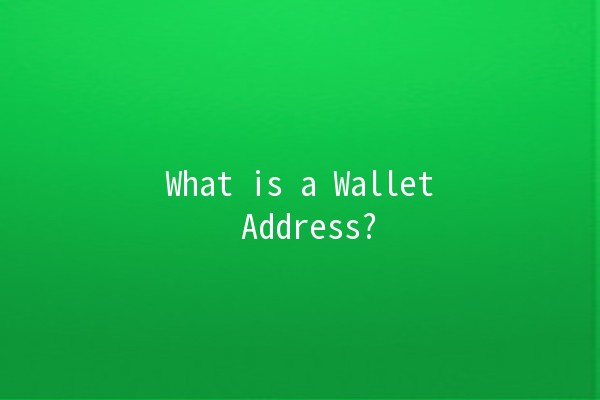
In the digital age, cryptocurrencies have taken the financial world by storm, introducing a myriad of new concepts and terminologies. One such essential component of cryptocurrencies is the wallet address. This article delves deep into what a wallet address is, why it is crucial, and practical tips for enhancing your understanding and usage of wallet addresses in the cryptocurrency space.
Understanding the Basics of Wallet Addresses
A wallet address, often referred to simply as an address, is a unique string of alphanumeric characters that serves as a digital location for receiving cryptocurrency transactions. Think of it as your email address, but instead of sending emails, it allows you to send and receive cryptocurrencies like Bitcoin, Ethereum, and many more.
Structure of a Wallet Address
Importance of Wallet Addresses

Understanding wallet addresses is vital for anyone looking to engage in cryptocurrency transactions for several reasons:
Productivity Tips for Managing Wallet Addresses
Effective management of wallet addresses can significantly enhance your cryptocurrency experience. Here are five tips to improve your productivity when dealing with wallet addresses:
Description: QR codes provide a quick and efficient way to share your wallet address. Scanning a QR code eliminates manual entry errors in transactions.
Example: Implement a QR code generator within your wallet software. When someone wants to send you funds, they can simply scan your QR code rather than type out your wallet address.
Description: If you deal with multiple cryptocurrencies or have various addresses for different purposes (like personal, business, or trading), categorize them for easy access.
Example: Create a folder on your device or within your wallet app labeled according to categories (e.g., “Personal,” “Trading,” and “Donations”), thus streamlining the process of finding the correct address when needed.
Description: Many wallet applications allow users to label their addresses. This feature helps keep track of which address is used for what purpose.
Example: Label your Bitcoin address as “Savings” and your Ethereum address as “Trading,” allowing you to easily identify the purpose of each wallet at a glance.
Description: Keeping track of transactions involving your wallet addresses can help you identify any suspicious activity promptly.
Example: Utilize blockchain explorers to monitor transactions associated with your wallet addresses. Set alerts for any incoming or outgoing transactions, allowing you to react swiftly to any anomalies.
Description: A backup of your wallet address (and other relevant data) ensures that you can recover it in case of device failure or loss.
Example: Use hardware wallets or secure cloud storage to back up your wallet address. Make sure to use encrypted storage for enhanced security.
Frequently Asked Questions
Wallet addresses vary by cryptocurrency. For example, Bitcoin has several types:
Legacy Addresses (P2PKH): Start with '1'.
P2SH Addresses: Start with '3'.
SegWit Addresses (Bech32): Start with 'bc1'.
Ethereum uses a standard address format that begins with '0x'.
Yes, you can have multiple wallet addresses. Many wallets allow you to generate as many addresses as you need, which is particularly useful for separating different types of transactions (such as personal and business).
While your wallet address is not personal identification, it is vital to exercise caution when sharing it. Avoid broadcasting your address publicly to minimize linking it to your personal identity.
Sending cryptocurrency to a wrong address generally results in a loss of funds, as most cryptocurrency networks do not support reversing transactions. Always doublecheck the address before sending.
Yes, you can change your wallet address. Most wallets allow you to generate new addresses, and you can stop using old addresses anytime. However, be aware that transactions sent to old addresses may still result in accessibility to funds, provided you have access to the wallet.
In most wallet applications, your wallet address can be found on the main screen or within the 'Receive' section. From there, you can copy the address to share or generate a QR code for easy access.
A wallet address is a fundamental aspect of cryptocurrency that facilitates sending and receiving digital assets. By understanding what wallet addresses are, their importance, and how to effectively manage them, you can enhance your experience in the crypto world. Applying the productivity tips outlined in this article will help ensure that your interactions in the cryptocurrency space are efficient and secure, paving the way for a more mindful and informed approach as you navigate this exciting financial landscape.

